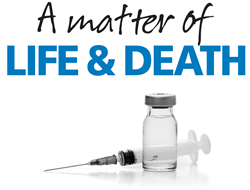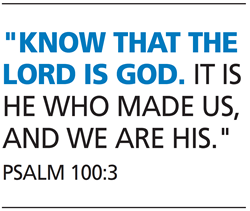Dear Friend,
Even though I walk through the valley of the
shadow of death, I will fear no evil, for you are with me;
your rod and your staff, they comfort me. (Ps 23:4)
Many have found solace in these words. For some Canadians, however, their comfort during dark times comes from knowing that doctor-assisted suicide is an “option.”
If societies are judged by how they take care of their weakest members, how would Canada measure up? Not very well if we consider the fact that almost 7,000 Canadians sought death through doctor-assisted suicide since it became legal three years ago.
It may be hard to understand why a person would choose to commit suicide. Societies fail their most vulnerable members when those who are suffering from chronic illnesses and disabilities do not have access to the quality care and compassionate support they need to choose life over death.
That’s why the EFC has been championing better access to palliative care options in Canada and has produced resources to assist local congregations to care for people in our communities who are suffering. Caring for the weak and vulnerable is part of who we are as Christ-followers.
The EFC vehemently opposed the legalization of medical assistance in dying (MAID), but when it became legal, we fought successfully, together with others, to have tight restrictions put in place. The law currently restricts MAID to competent, consenting adults whose natural deaths are reasonably foreseeable and who are in advanced states of irreversible decline.
The ink was barely dry on the legislation when there were demands for the government to extend MAID to people suffering from incurable conditions who are not nearing death. This would impact many – including those living with juvenile diabetes, those who have lost their sight or the use of a limb, those living with dementia, and even those who are simply aging.
It’s one thing to talk about assisted suicide when one is near death. It’s exponentially alarming to make it possible for those who are not nearing end of life to have access to MAID at a time of their own choosing. Isn’t this why we support suicide prevention programs and affirm laws against murder? If we believe that all humans are created, loved and honoured by God, we insist that certain limits should be placed on individual choice (when it comes to taking a life, for example) for the sake of the greater good.
Lord, I know that people’s lives are not their own;
it is not for them to direct their steps (Jer. 10:23).
Far from removing the stigma that a life with an incurable illness or physical disability is a life not worth living, increased accessibility to MAID as a “treatment option” will put the vulnerable at greater risk of harm from coercion and abuse. Those who fear becoming a burden might feel pressured to request assisted suicide.
Unfortunately, two major developments this past month has made it possible for more Canadians access MAID. In a landmark decision, a Quebec Superior Court Justice stuck down the Criminal Code requirement that a patient’s natural death be “reasonably foreseeable” as well as the section of the Quebec law that requires a patient to “be at the end of life.” The judge has given federal and provincial legislators six months to respond. The Attorney General of Canada must now decide whether to appeal the decision and ask the Quebec Court of Appeal – and ultimately the Supreme Court of Canada – to rule on the constitutionality of the “reasonably foreseeable” death criterion; or to amend the legislation to allow consenting adults experiencing unbearable suffering to demand MAID at a time of their choosing.
And in British Columbia, the Lamb case was adjourned last month. Ms. Lamb, who has a genetic disorder that causes progressive weakness and damage to voluntary muscles, was worried about a time in the future when she may wish to end her life via MAID but may not have the ability to express her wishes. She believed the current laws made her ineligible for MAID at this time. However, with the emergence of a more expansive interpretation of the “reasonably foreseeable” death criterion, it turns out Ms. Lamb would only have to express a clear intent to stop taking measures to prevent pneumonia from developing and to refuse treatment when pneumonia inevitably occurs. Apparently, this would make the timing of her natural death predictable and results in her being eligible to make an advance request for MAID now, even though she does not currently have pneumonia and death is not imminent. By logical inference, this ability to fabricate a “reasonably foreseeable” death would mean that any person who suffers from an incurable condition would only have to express an intent to stop taking all food and liquids to become eligible for MAID!
The EFC upholds respect for human life and care of vulnerable persons. We are considering options for legal involvement to continue to defend the inherent and equal worth of all humans before our courts and governments, and to ensure that the current safeguards for MAID remain in place. Expanding access to MAID will increase the risk of wrongful deaths and further undermine societal respect for life. This is literally a matter of life and death! Will you help ensure that Canadians will never have to defend their right to live at the most vulnerable time in their lives? Will you please consider making a generous donation today?
Sincerely,
David Guretzki
Executive Vice-President & Resident Theologian